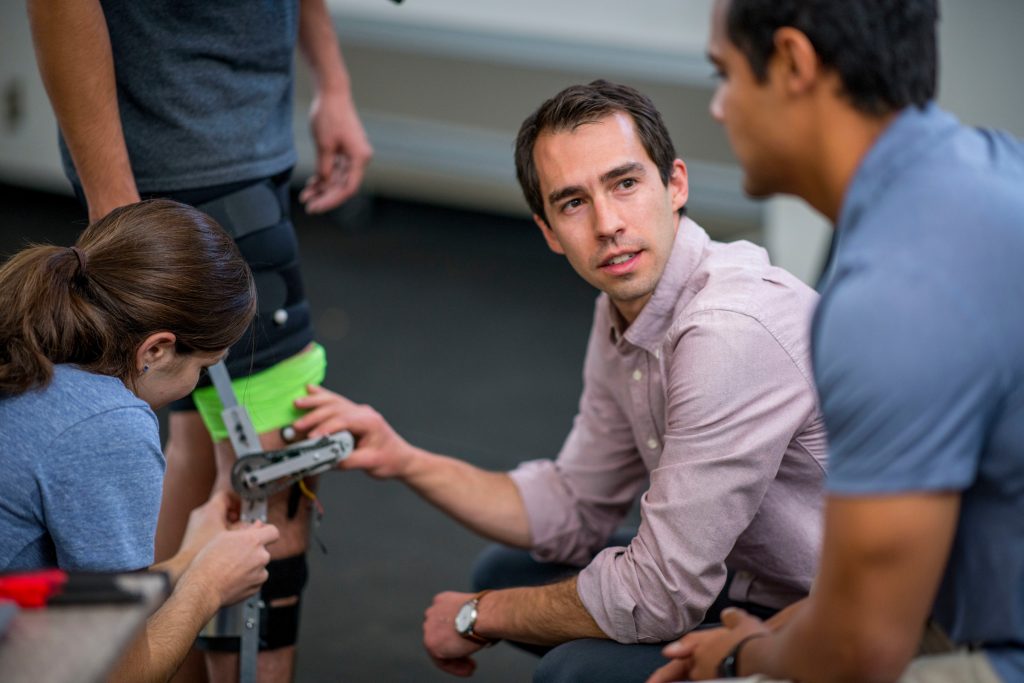A donation from past NAU parents and longstanding NAU Athletics donors Greg Winn and Mary Winn-Radcliff will allow NAU researcher Zach Lerner to rapidly advance wearable robotics research in the NAU Biomechatronics lab.
The gift to the NAU Foundation will allow Lerner, a 2010 NAU graduate and assistant professor of mechanical engineering, to expand and improve mobility for individuals with neurological impairments. He and his team of student and post-doctoral researchers focus on designing, controlling and testing robotic exoskeletons. The new Mary M. Winn-Radcliff and Gregory M. Winn Research Award will allow Lerner to broaden his research to impact people living with spinal cord injuries and contribute to NAU’s distinguished research programs in related fields such as bioengineering and biotechnology.
For Greg Winn, donating to this cause is personal—his brother, Lance Winn, suffered a spinal stroke during back surgery a few years ago, which left him initially paralyzed from the waist down.
“I am hopeful that Dr. Lerner’s research will be the next step to delivering a definitive chance for individuals, like Lance, to reclaim their independence,” he said.
Lerner’s research is devoted to developing improved exoskeletons, which can significantly augment human function by improving performance, mobility and recovery through enhanced rehabilitation. Wearable exoskeletons are customized to improve coordinated muscle control, fatigue resistance and walking efficiency.
“With the devices and interventions we are developing, people will be able to engage with a targeted neuro-rehabilitation strategy every single day,” Lerner said. “And this increase in dose should be really effective because our lightweight wearable assistive devices can be used anywhere.”
After his life-changing accident, Lance Winn has made many strides toward walking again.
“The accident turned my life upside down, but I am determined to reclaim my independence,” he said. “I went from using a walker to crutches, and most recently, a cane. My progress is a result of hard work and a positive mindset.”
Lance Winn met Lerner at the NAU Phoenix Biomedical Campus, where Lerner’s team conducted a live experiment by modifying a prototype device to fit him. The experience made Lance Winn hopeful and excited to reach another milestone. Wearing the device regularly could enable him and many others to walk longer distances, and it also could help with stability and strength and decrease fatigue.
“The team’s enthusiasm, focus and dedication to developing solutions that will improve the lives of so many people excite a person like me,” Lance Winn said. “It helps me envision the future and motivates me to be an advocate for the greater spinal cord community. This research is going to improve people’s health and well-being.”
The Winns’ gift enhances the NAU learning experience. Applying elements of mechatronics and robotics research in the classroom expands knowledge and engages students in the College of Engineering, Informatics, and Applied Sciences with cutting-edge technology.
“Devoted NAU Foundation donors like Greg, who align their philanthropic priorities with the vision of NAU’s talented research faculty, drive meaningful discovery and solutions,” President Rita Cheng said. “Donor support advances NAU’s research excellence and helps develop passionate minds in the lab and the classroom.”
Contributions from generous donors helps strengthen NAU’s biomechatronics research opportunities. Lerner’s long-term vision to broaden the scope of his research will impact many more potential beneficiaries over time.
Learn more about NAU’s Biomechatronics Lab by visiting biomech.nau.edu and support the lab’s innovative research by contacting Kelley.Horn@nau.edu.



